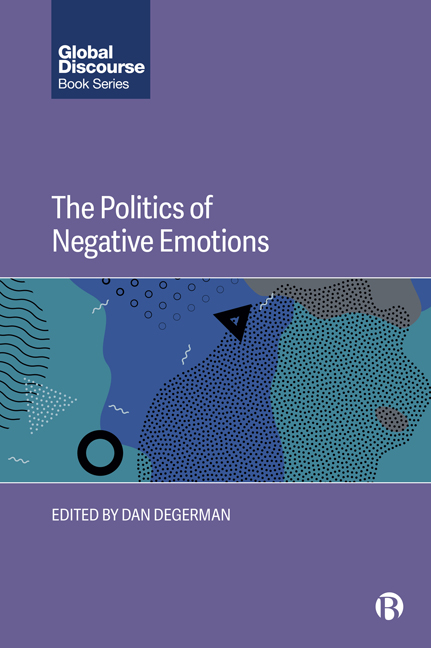Book contents
- Frontmatter
- Contents
- List of Figures
- Notes on Contributors
- Introduction: Feeling Our Way through Politics
- 1 Anger, Fast and Slow: Mediations of Justice and Violence in the Age of Populism
- 2 ‘We Will March Side by Side and Demand a Bigger Table’: Anger as Dignity Claim
- 3 Moving between Frustration and Anger
- 4 The Resentment– Ressentiment Complex: A Critique of Liberal Discourse
- 5 Green Shame: The Next Moral Revolution?
- 6 Against Comfort: Political Implications of Evading Discomfort
- 7 For Love and for Life: Emotional Dynamics at the World Congress of Families
- 8 The Functionality of Affects: Conceptualising Far-Right Populist Politics beyond Negative Emotions
- 9 Moral Economies of Exclusion: Politics of Fear through Antagonistic Anonymity
- 10 Contesting the Politics of Negative Emotions in Educational Policy Making: A Ban on Asylum Seekers’ School Visits in Finland
- Index
8 - The Functionality of Affects: Conceptualising Far-Right Populist Politics beyond Negative Emotions
Published online by Cambridge University Press: 18 January 2024
- Frontmatter
- Contents
- List of Figures
- Notes on Contributors
- Introduction: Feeling Our Way through Politics
- 1 Anger, Fast and Slow: Mediations of Justice and Violence in the Age of Populism
- 2 ‘We Will March Side by Side and Demand a Bigger Table’: Anger as Dignity Claim
- 3 Moving between Frustration and Anger
- 4 The Resentment– Ressentiment Complex: A Critique of Liberal Discourse
- 5 Green Shame: The Next Moral Revolution?
- 6 Against Comfort: Political Implications of Evading Discomfort
- 7 For Love and for Life: Emotional Dynamics at the World Congress of Families
- 8 The Functionality of Affects: Conceptualising Far-Right Populist Politics beyond Negative Emotions
- 9 Moral Economies of Exclusion: Politics of Fear through Antagonistic Anonymity
- 10 Contesting the Politics of Negative Emotions in Educational Policy Making: A Ban on Asylum Seekers’ School Visits in Finland
- Index
Summary
Introduction
In politics, it is common to frame emotions in negative terms as a manifestation of undesirable, irrational, illegitimate or even immature political conduct. The far right in particular has seemingly been perceived as an affective space that harnesses and amplifies a multiplicity of negative emotions. As part of a wider ‘affective turn’ (Clough and Halley, 2007) in the study of politics, scholars and observers have increasingly engaged with emotional dynamics in political arenas. They have particularly characterised far-right politics by the use of fear (for example, Wodak, 2015), rhetoric of rage and anger (Cox and Durham, 2000; Ebner, 2017; Mishra, 2017) and expressions of hatred (Blee, 2002; Garland and Treadwell, 2012; Emcke, 2019). To conceptualise the affective trajectories of far-right politics, some authors have bundled a multiplicity of negative emotions in the form of Friedrich Nietzsche's concept of ‘ressentiment’ (Betz, 2005; Salmela and von Scheve, 2017). In On the Genealogy of Morals, Nietzsche has imagined a person who is driven by ressentiment to be the opposite of a ‘noble man’. He has explained that ressentiment is both the condition of the dominated, who suppress their negative emotions, and the source that legitimises their vengeance towards their adversaries. The figures in Nietzsche's normative concept are construed as rather abstract moral figures that eventually enable an evaluation of the legitimacy of their political conduct.
The political discourse in Germany has witnessed the emergence of a new version of the moral figure driven by ressentiment and an array of negative emotions: the Wutbürger, which translates literally to ‘irate citizens’. The term was established by the German journalist Dirk Kurbjuweit (2010), and the figure is frequently invoked in contemporary political debates to epitomise both the rise of far-right populist politics and the underlying, threatening nature of those political constellations for liberal democracies. In contemporary debates, the Wutbürger are mainly associated with the Patriotic Europeans Against the Islamisation of the Occident's (PEGIDA) ‘evening strolls’ and the Alternative für Deutschland's (Alternative for Germany, AfD) constituency The Wutbürger are imagined as political subjects who are driven by their negative emotions and, as such, are placed with similar political agents, such as Michael Kimmel's ‘angry white men’ (2017), in a cluster of ‘anti-democratic’ (Salzborn, 2017), ‘ignorant, irrational, misinformed nationalists’ (Brennan, 2016: 23).
- Type
- Chapter
- Information
- The Politics of Negative Emotions , pp. 156 - 176Publisher: Bristol University PressPrint publication year: 2023



